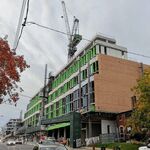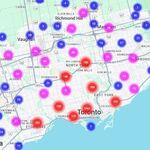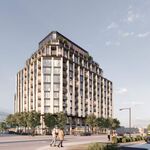It doesn't have to be for "everyone". For the majority, it is possible to take that trip via public transit. Practical is open for interpretation. It appears that for many drivers, they are willing to pay the price in both dollars and time to ensure they can get from point a to b in the luxury of their private vehicles.
So...remove all the trips by cars that could have been made by public transit (the majority of trips by car), and there would be plenty of space for those that can't to get around without the congestion.
You keep saying "majority" as if it's an accepted truth, which I question. I would say the split is far more even, or perhaps favors the car, but I can't support with stats that I don't have. if you can refute this with some of your own, please do.
Building more freeways is NOT a tool to decrease congestion.
Whether it's a good tool or affordable tool or environmentally friendly tool may be up for debate - but whether it is or isn't a tool is not. It certainly IS
one of the tools available.
Making car drivers pay the real cost of owning and operating their vehicles is one tool that would get many to change their travelling habits.
You don't think drivers do pay the real cost of owning and operating their own vehicles? Or do you mean the real cost of roadway construction and maintenance, or other indirect costs? Not only do drivers pay every level of property, sales and income tax as everyone else - they also pay rather large % of taxes on the fuel they put into their cars, which generates far more tax revenue than is used for roads, infrastructure, snow cleaning, hell - even the cost of emergency services in the case of accidents.
Improving transit service/capacity is another tool to lure drivers out of their cars.
Since drivers should be expected to pay the full cost of their chosen method of transport, would you also be in support of transit users also paying the full cost of their choice? Ie: the full cost of infrastructure, maintenance, operations, fuel, etc... or should this be subsidized by drivers (as it is), or subsidized by general revenues (which it is). I'm not saying transit shouldn't (it certainly should be subsidized), but question your double standards.
But there's really only one way to truly deal with our road congestion...and that's better urban planning/built environment policies. Trying to come up with solutions to try and sustain an unsustainable scenario is just stupid. It's a little late for that for the 905, so making it better will be a long, painful journey, and it will probably never be even acceptable in our lifetimes. Take a bow post war urban planning "pros".
Even the old city of Toronto, which actually has a chance at efficient, sustainable means of travel, will be facing an uphill battle.....our own mayor is even more delusional than his suburban counterparts about what to do. His #1 priority is to get streetcars off the roads, because they are "in the way" of cars. That's right....the most efficient users of the road system, that also happens to be zero emissions, the safest way to travel and makes money...is the enemy (in the "war on cars").
Maybe there is a "war on the car"....and maybe there isn't. But one thing is for sure....there is in the mind of our mayor. And he's fighting for the wrong side.
I agree on the first paragraphs, but disagree somewhat on the second. If the streetcar itself is low or zero emissions, but slows down cars by 10, 20 or hell 50%, does it not indirectly increase the emission of a far greater number of vehicles stuck behind it? Does creating sets of green lights for streetcars not also increase the wait time for an even larger numbers of cars, buses and trucks that have to wait for it? If it's zero emission, then maybe for the sake of the environment, the streetcar is the one that should idle?
I'm all for efficiency and emission reduction, regardless of which technology is used. Better transit = fewer drivers = less traffic = less polution, but one is not more important than the other, they must be carefully balanced. Drivers should support the notion of better transit because it gets more drivers off the road they're on, shortens their own drive time and reduces their emissions. Transit users should support good roads and highways, since it means even their buses and streetcars will move faster and remember that driver revenues (mostly gas taxes) subsidize that seat they're sitting on, even if it's a subway car or train.





